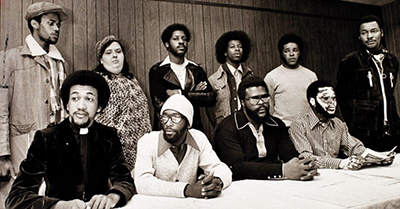McKoy died on November 10th, at the age of 69.
By Stacy M. Brown
For The Washington Informer@StacyBrownMedia
Funeral services for James “Bun” McKoy, a member of the civil rights and political prisoner group The Wilmington Ten, were held on Friday, Nov. 17. McKoy died on November 10th, at the age of 69.
The cause of death was not immediately disclosed. McKoy’s life was forever changed on Feb. 1, 1971, when Dr. Benjamin F. Chavis Jr. arrived in Wilmington. Chavis made the journey at the invitation of a local preacher who wanted the Dr. Martin Luther King, Jr. disciple to lead a boycott of the desegregated high schools that refused to acknowledge King, who had been slain just three years earlier.
By 1969, the city had only three high schools: all-white New Hanover and Hoggard, and all-Black Williston Senior High School. Officials eventually relocated Black students and teachers to New Hanover and Hoggard and closed Williston, and African Americans faced increased racially motivated name-calling, physical attacks, and threats in the schools, while riots occurred virtually daily.
Chavis, McKoy, Connie Tindall, Marvin “Chilly” Patrick, Wayne Moore, Reginald Epps, Jerry Jacobs, Willie Earl Vereen, William “Joe” Wright, Jr., and Ann Shepard comprised the Wilmington Ten, and the group advocated for Black history classes, respect for Martin Luther King Jr. and all Black people, and equality.
However, tensions reached a boil in Wilmington, with the Ku Klux Klan and other white nationalists firebombing buildings and shooting at Black pupils, and then on a cold February night, the popular Mike’s Grocery Store was firebombed, leading to more chaos.
As police and firefighters approached, a sniper fired at members of the Wilmington Ten, striking one of the officers. “Chilly” Patrick, one of the Wilmington Ten, stood in front of a sniper’s bullets to save Chavis. Police ultimately arrested the group and falsely charged them with firebombing the grocery store.
Racist prosecutors forced witnesses to go against their court-appointed lawyers during the trial and give false testimony accusing McKoy and others of arson and violence towards law enforcement.
When it became clear that 10 African Americans would be seated for jury duty, Prosecutor Jay Stroud pretended to be ill during jury selection. A second trial included only two African Americans, and the Wilmington Ten were convicted.
McKoy and the other defendants received a total of 282 years in prison. At the age of 19, McKoy’s 29-year sentence was the third-longest handed down to any of the members. Chavis, the then-24-year-old commander, was sentenced to 34 years in prison, while Tindall got 31 years. The Wilmington 10, consisting of nine Black males and one white woman, spent nearly a decade in jail before their convictions were overturned by federal appellate courts because of prosecutorial misconduct.
In 1976, Amnesty International took over the group’s defense. The London-based human rights organization declared the Wilmington Ten to be “prisoners of conscience.” They were arrested not for the crimes they were charged with, but because of their political activities. Amnesty International’s proclamation about the Wilmington Ten upset some and embarrassed others, especially when they were awarded the Nobel Peace Prize that year, as reported by The New York Times.
“Soon the charge was repeated and amplified by the American Ambassador to the United Nations, Andrew Young, who contended in an interview with a French newspaper that the United States harbored ‘hundreds, perhaps thousands of political prisoners,’” according to the newspaper.
“The Wilmington Ten, for example, are innocent,” Young stated. He later reiterated that the charges against the group were “trumped up,” according to the Times.
In December 1980, the convictions of the Wilmington Ten were finally overturned. Timothy Tyson, a North Carolina history, and Duke University visiting professor, told CNN that he was handed the Wilmington Ten prosecutor’s handwritten notes before 2012, when the NNPA and NAACP called for pardons of innocence for the Wilmington 10. “It was pretty shocking stuff,” Tyson said of the incident.
He mentioned at least six potential jurors who had “KKK Good!!” scribbled next to their names. It said next to a woman’s name, “NO, she associates with Negroes.”
The prosecutor, Jay Stroud, had written the benefits and drawbacks of a mistrial on the back of the legal pad, according to Tyson. One of the benefits was a new jury and a fresh start.
In 2012, 40 years after they were wrongfully convicted, the Wilmington 10 were pardoned by North Carolina Gov. Beverly Perdue.
“These convictions were tainted by naked racism and represent an ugly stain on North Carolina’s criminal justice system that cannot be allowed to stand any longer,” the state’s governor stated at the time. “Justice demands that this stain finally be removed.”
Responding to McKoy’s death, Chavis reflected on the group and his fallen comrades. “Once again, I am saddened at the passing of another freedom fighting member of the Wilmington Ten,” Chavis remarked. He said McKoy was dedicated to the freedom movement in Wilmington and globally. “He was also a master base guitarist who would always play the right beat with the inspiring music of freedom,” Chavis recalled. “May James ‘Bun’ McKoy rest in power and in peace and may his memory and uplifting spirit live on for generations to come.”

